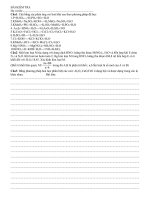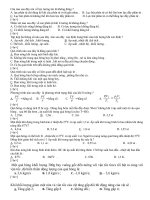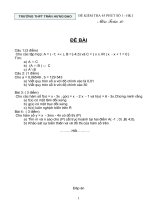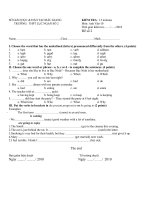KIEM TRA TU LUAN BAI 2 LOP 10 hs kha
Bạn đang xem bản rút gọn của tài liệu. Xem và tải ngay bản đầy đủ của tài liệu tại đây (310.08 KB, 4 trang )
<span class='text_page_counter'>(1)</span><div class='page_container' data-page=1>
h - 1 - h
<b>SỞ GIÁO DỤC VÀ ĐÀO TẠO </b> <b> KIỂM TRA KIẾN THỨC BÀI HỌC SỐ 2 LỚP 10 </b>
<b> BÌNH PHƯỚC </b> <b> Môn: TIẾNG ANH </b>
<b> </b> <b> </b>
Thời gian làm bài: 50 phút (không kể thời gian phát đề).
Ngày làm bài: 11/9/2012.
<b>Họ tên: </b>……….. <b>Lớp: </b>………
<b>I - PRONUNCIATION. Pick out the word whose underlined part is pronounced differently from that of </b>
<b>the others. (1,0 point – 0,1/each) </b>
<b>A. Choose the word that has the underlined (letters) pronounced differently from the others. </b>
1. chance teaching chemistry children ...
2. hard start party talk ...
3. son sunshine above woman ...
4. polite literature guide kind ...
5. great teacher street receive ...
<b>B. Choose the word whose main stress is placed differently from the others. </b>
1. Physics History Biology Chemistry ...
2. important profession Geography Literature ...
3. entertain communicate receive complain ...
4. children student professor teacher ...
5. opinion relax semester nervous ...
<b>II - VOCABULARY. Complete the sentences with the correct form of the words in the box. (1,0 </b>
<b>points-0,1/each)</b>
<b> </b>
1. The police gave him protection for his own...
2. How many times do I have to ask you to pay...?
3. The company made hundreds of... redundant.
4. The store was... with shoppers.
5. The show brought ...to millions of viewers.
6. She listens to classical music for ...
7. Cinema is a medium of mass...
8. He can calculate very quickly. He has an amazing ability to solve ... problems.
9. In 1963 he was appointed...of history.
10. Dang Thai Son is a Vietnamese pianist with an...reputation.
<b>III - COMMUNICATION. Choose the sentences or phrases that best complete this dialogue. (0,6 </b>
<b>point-0,1/each) </b>
A: (1)... in your exam!
B: (2)...I hope we both pass
A: Did you study all last night?
B: (3) ...I watched TV and went to bed. (4)...
A: I did the same. (5)... after the exam.
B: All right. (6) ...for a drink.
1. How are you Have a good Good luck What about you ________
2. Like you. Same to you. Same of you. You do. ________
3. Yes. I did. No, of course not Of course I did. I not do that. ________
4. What about you? How are you? And you did? What did you? ________
<b>ĐỀ KIỂM TRA </b>
<b>entertain </b> <b>maths </b> <b>nation </b> <b>relax </b> <b>safe </b>
</div>
<span class='text_page_counter'>(2)</span><div class='page_container' data-page=2>
h - 2 - h
5. Good bye Nice to see you See you later Meet you again ________
6. We go Let's go Could you go Don't you go ________
<b>IV. Complete the questions with the appropriate words (1,4 point – 0,1/each) </b>
1. ... do you want? ~ A box of chocolates.
2... is this building? ~ It's about two hundred years old.
3. ... money do you earn? ~About £250 a week.
4. ... bag are you carrying? ~ Judy's.
5. ... first stepped on the moon? ~Neil Amstrong, wasn't it?
6. ...is your new school? ~ It's very big and friendly.
7. ...is it to tile post office? ~ About two hundred meters.
8. ... is your national flag? Red and yellow.
9. ...do you take a holiday? ~ Once a year.
10. ...is Greg like'? ~ He's tall and thin with brown hair.
11. ... did the. Second World War end? ~ in 1945.
12. ...is a half of football? ~ forty-five minutes.
13. ... of holiday are you interested in?"~ package holiday.
14. ... hand do you write with? ~ My right hand.
<b>V – GRAMMAR. Use the correct tenses or forms of the following verbs in brackets. (1,0 points – </b>
<b>0,1/each) </b>
Being a student involves (1)... (take) responsibility for (2)... (organize) your own time,
therefore, you need (3)...(learn) about planning your time and workload effectively. You can learn to
do this through practice and through stopping (4)...(think) about what works or doesn't work for you.
Try (5)... (set) yourself goals and target and give yourself small rewards. Don't try (6)...
(do) too much at once have regular breaks. If you fail (7)... (finish) a piece of work as quickly as you
expected, don't feel bad, just be more realistic your planning next time. If you find that you avoid even
(8)<b>...</b> (start) work, stop (9)...(make) excuses and start today! You will (10)………….. (feel)
much better once you do.
<b>VI. Complete the conversations. Put in a </b><i><b>to-infinitive </b></i><b>or an </b><i><b>in -form.</b></i><b> (1,0 points – 0,1/each) </b>
0. A: I always want to visit San Francisco.
B: Me too. I'd love <i>to visit </i>it some time.
1. A: Tom seems to enjoy watching football matches.
B: Yes, he loves... Manchester United play.
2. A: Do you think they'll approve the plan?
B: Yes, I'm quite sure they'll decide ... it.
3. A: Do you want to come with me or wait here?'
B: I'd prefer ... with you if that's OK.
4. A: You wear a uniform at school, don't you?
B: Yes, I have to, although I dislike...it.
5. A: I'm glad I don't work as late as Sarah does.
B: Me too. I wouldn't like... such long hours.
6. A: Have ICM bought the company?
B: Well, they've offered ... it.
7. A: How long have you been working here?
B: For about three years. But now I need a new job. I can't stand ... here any more.
8. A: What time will you be back?
B: Oh, I expect... back some time around nine
9. A: I'm sorry you had to wait all that time.
B: Oh, it's all right. I don't mind... at all.
10.A: Tony, You are making so much noise?
</div>
<span class='text_page_counter'>(3)</span><div class='page_container' data-page=3>
h - 3 - h
<b>VII – READING. Read the passage and do the tasks that follow. (2,0 points – 0,4/each) </b>
Many people now think that teachers give students too much homework, they say that it is unnecessary for
children to work at home in their free time. Moreover, they argue that most teachers do not properly plan the
homework tasks they give to students. The result is that students have to repeat tasks which they have already
done at school.
Recently in Greece many parents complained about the difficult homework which teachers gave to their
children. The parents said that most of the homework was a waste of time, and they wanted to stop it Spain and
Turkey are two countries which stopped homework recently. In Denmark, Germany and several other countries
in Europe, teachers cannot set homework at weekends. In Holland, teachers allow students to stay at school to
do their homework. The children are free to help one another. Similar arrangements also exist in some British
schools.
Most people agree that homework is unfair. A student who can do his homework in a quiet and
comfortable room is in a much better portion than a student who does his homework in a small, noisy room with
the television on. Some parents help their children with their homework. Other parents take no interest at all in
their children's homework.
It is important, however, that teachers talk to parents the homework. A teacher should suggest suitable tasks
for parents to do their children. Parents are often better at teaching their own children!
16.What are people thought at present?
_____________________________________________________
17.Why do many parents want teachers to stop giving homework to their children?
_____________________________________________________
18.Where are students allowed to stay at school to do their homework?
_____________________________________________________
19.Why do most people agree that homework is unfair?
_____________________________________________________
20.Why do teachers suggest suitable tasks for parents to do their children?
_____________________________________________________
<b>VIII. WRITING – Write the sentences from the suggested words</b>. <b>(2,0 points – 0,4/each) </b>
1. Why/ you/ consider/ don't/ visit/ me
………...
2. subject/ you/ what/ best/ like
………
3. really/ like/ up / I/ morning/ don't/ get / in early
………
4. learn/ Son/ for/ four years/ English/ so/ he/ the language/ speak/ well
………
5. children/ work/ profession/ love/ interested/ because/ I/ teaching.
………
<b>== THE END == </b>
</div>
<span class='text_page_counter'>(4)</span><div class='page_container' data-page=4>
h - 4 - h
<b>SUBJECT : Gerund or Infinitive </b>
<b>A) Use the GERUND or INFINITIVE forms of the verbs: </b>
1. He gave up ……….. (gamble).
2. He told me ……… (try) ……….. (come) early.
3. I advised him ………. (ask) the bus conductor ……… (tell) him where ……….. (get) off.
4. We are looking forward to ……….. (read) your new book.
5. I don’t enjoy ……….. (go) to the dentist.
6. A: Did you remember ………. (give) him the money?
B: No, I didn’t. I still have it in my pocket; but I’ll ………. (see) him tonight and I promise ……… (not /
forget) this time.
7. I saw the plane ………. (crash) in to the hill and ………. (burst) into flames.
8. He is said ……… (be) the best surgeon in the country.
9. We don’t want anybody ………. (know) we are here.
10. A: Why didn’t you pay the bill for him?
B: I offered ………. (pay), but he refused.
11. He was accused of ……….. (steal) the valuable vase.
12. I don’t feel like ……….. (work); what about ………. (go) to a disco instead?
13. Imagine ………. (live) with someone who never stops ……….. (talk).
14. A: Do the boys tidy their own rooms?
B: They are supposed ……… (tidy), but they don’t always.
15. I hope the children won’t go near the water. I warned them ……… (not / go) near it.
16. Try to avoid ……….. (make) him angry.
17. Would you mind ……….. (write) your name and address on the back of the cheque?
18. After ……… (read) this article, will you give up ……….. (smoke)?
19. I suggest ……….. (hold) another meeting next week.
20. I have no intention of ………. (go) to that film; I couldn’t bear ……….. (see) my favorite actress in such a dreadful
part.
<b>B) Use the GERUND or INFINITIVE forms of the verbs in brackets: </b>
1. After she had decided ……… (stay) in Turkey, she got used to ……… (eat) Turkish foods.
2. They seem ………. (have) plenty of money.
3. I’m sorry sir, I’m late, but I promise ……….. (not / be) late again.
4. I remember ……… (go) to the cinema with my girl friend when I was a teenager.
5. He is ashamed of ……… (steal) that money.
6. I think we’d better ………. (exchange) names and addresses.
7. Would you mind ………. (show) me how ……….. (work) the new machine?
8. She warned her child ……… (not / touch) the wire.
9. Can you manage ……… (finish) ……… (pack) these parcels alone?
10. His doctor advised him ……… (give up) ……….. (sit) up late at night?
<b>C) Supply the appropriate form of the verbs: </b>
1. She never admits ……….. (make) mistakes.
2. Please avoid ………. (be) alone with him.
3. When you finish ……….. (do) your homework, call me.
4. She’s considering ……… (be) a member of T.E.D. Club.
5. On Sundays I always practise ……… (talk) English with my aunt.
6. Do you fancy ……….. (play) tennis this afternoon?
7. I dislike ………. (study) history.
8. Please try to escape ……….. (make) him angry.
9. I enjoy ……….. (walk) in the rain.
10. She can’t afford ……….. (buy) a car.
<b>E) Use the GERUND to connect the following: </b>
1. Peter’s sometimes late. He can’t help it.
…………Peter can’t help being late. ………..
2. Gordon has to get up early. He dislikes it.
………..
3. Paul asked Mary to come home. He remembers it.
………..
4. Jill occasionally speaks Spanish. She can’t avoid it.
………..
5. Jim didn’t take his holiday until June. He delayed it.
………..
6. Jim was speaking French when Bob came in. He stopped.
……….
7. Jim wanted to see the race. He didn’t want to miss it.
……….
8. You may have an accident if you drive that car. You risk it.
……….
9. I wouldn’t like to work in an office. I don’t fancy it.
……….
10. I spent all my money. I regret it, because I’ve got none left
now.
</div>
<!--links-->








